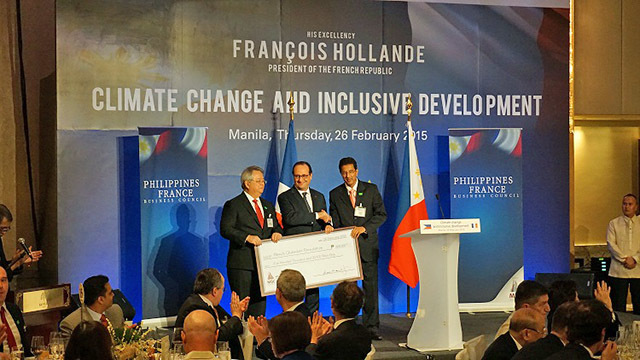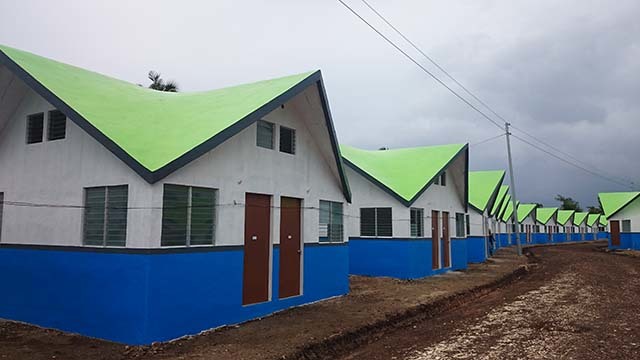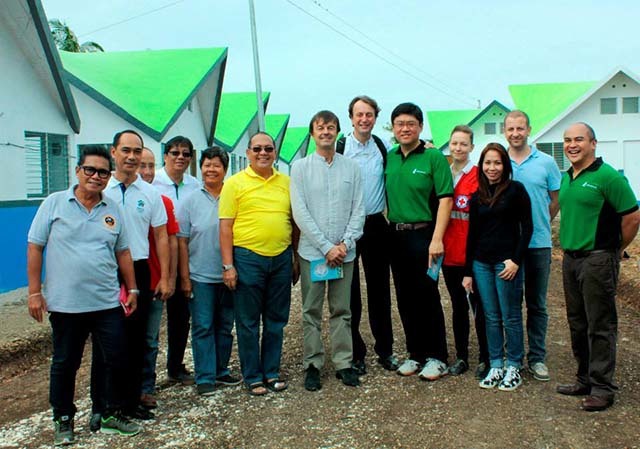A housing project for the victims of Super Typhoon Yolanda (Haiyan) led by French businesses in the Philippines catches the attention of the French president
 PRAISING. Dilip Vaswani (right) Chairman of FP-UA, receives P 500,000 from French President Hollande to turn FP-UA into a foundation
PRAISING. Dilip Vaswani (right) Chairman of FP-UA, receives P 500,000 from French President Hollande to turn FP-UA into a foundation
MANILA, Philippines – An initiative that built housing for the victims of Super Typhoon Yolanda (Haiyan) led by French businesses in the Philippines caught the attention of the French president – and will soon be a foundation that will help more communities rise from the ruins of disaster.
During a forum on climate change and inclusive growth in Makati City, French President Francois Hollande cited the France-Philippines United Action (FP-UA) as a model for cooperation among businesses.
“French businesses got together within the France-Philippine United Action to coordinate private aid for reconstruction,” Hollande said in his speech during the forum, hosted by the Makati Business Club (MBC) last Thursday February 26, during the French leader’s first official visit to the country.
The French government recognized the success of what was initially just a “French village” using disaster-resilient housing design and the quick pace of bringing help to the affected, said Dilip Vaswani, chairman of FP-UA and President of Total Philippines.
Early birds
Just days after Yolanda hit the Visayas in November 2013, the French Ambassador to the Philippines, Gilles Garachon, brought together representatives from leading French businesses, the French embassy, and the French Chamber of Commerce and Industry in the Philippines to form a consortium to coordinate the individual aid efforts by French firms.
At the time the French Chamber of Commerce was tapped to act as caretaker to the initiative. It was also decided that management would be provided by a one-year rotating chairmanship offered to French firms that are members of the chamber.
The representatives eventually decided to pool the money each firm was raising and consolidate it into the building of housing projects for victims who had lost their homes during the typhoon.
A memorandum of understanding was signed just two months after the typhoon hit for the construction of a first village, located in Barangay Agujo, Daanbantayan, Cebu.
“They were the early birds, they were the first to come in, they kept us going and they are still here” said Daanbantayan Mayor Augusto Corro.
The initial memorandum of understanding eventually culminated in the creation of two villages in Daanbantayan just a year after Yolanda brought life to a standstill there.
Over 74 houses have already been built with an additional 148 to be built by June of this year, along with two multi-purpose centers and a clinic.
Grassroots approach
“When we started this, we aimed to create a start over approach to reconstruction and look at it from the grassroots,” said Don Lee, CEO of Lafarge and former FP-UA chairman.
This approach has led the initiative to structure itself differently from traditional non-government organizations (NGOs).
FP-UA essentially plays the role of a coordinator in reconstruction. It sources donations and materials, as well as identifies potential sites through its member firms’ network of contacts.
It then seeks out a partner NGO, such as its current partners Habitat for Humanity and the Red Cross, to implement these ready-made projects on the ground.
 Houses in Daanbantayan featuring hyperbolic paraboloid roofs
Houses in Daanbantayan featuring hyperbolic paraboloid roofs
One of the fruits of this approach was the adoption of an innovative hyperbolic paraboloid roof design in the Daanbantayan village.
The roofs can withstand up to 275 kilometers per hour (km/h) winds as it is made out of concrete, not galvanized iron sheets. Materials required to build these advanced roofs were either donated or sold at a reduced rate to the implementing NGO by FP-UA member firms.
These are actually better homes for the recipients, compared to before the typhoon struck. The beneficiaries have never actually lived in a home with a concrete roof, which is much cooler compared to a galvanized iron sheet which allow the sun’s heat to pass straight through, Lee noted.
Transparency is the key to the initiative according to Lee. The vast majority of donations come from business people and as business people themselves, the people behind FP-UA understand the importance of accounting for money spent.
According to Lee, what normally happens is a company donates and isn’t provided an accounting of how the money was spent, so the donor is left to hope that it goes to good use.
FP-UA keeps donors informed on the progress of projections through detailed updates. In the first village for instance, donors were told how many individual houses their contribution actually created.
“This hasn’t been done before. You’re making the whole process much more transparent, much more rewarding for the donors and that’s how you get more donors.” he said.
And that’s what happened as the success of the first village reached France. This prompted French firms based there to contact FP-UA asking for more projects to donate to.
It also led Nicolas Hulot, Special Envoy of the French President, to visit FP-UA’s two villages in Daanbantayan on a trip to the country to pave the way for Hollande’s official visit.
Here to stay
 Special Envoy of the French President Nicolas Hulot (7th from Left) on his visit to the Daanbantayan village.
Special Envoy of the French President Nicolas Hulot (7th from Left) on his visit to the Daanbantayan village.
Hulot was so impressed with the initiative’s projects that he alerted the Elysee Palace of the initiative, shared Christophe Riout, President of the French Chamber of Commerce.
This culminated in Hollande announcing a donation worth P500,000 ($11,338) to the initiative’s caretakers, the French Chamber of Commerce and Industry in the Philippines.
The donation was made possible at the request of the French government that the proceeds of the special event be donated to FP-UA in order to kick start its conversion into a foundation.
The French government is in the midst of raising awareness to combat climate change and wanted to celebrate FP-UA’s “parallel but aligned action”, Riout said.
The donation is meant as seed money to become a foundation. An additional P500,000 ($11,338) is needed to meet the Securities and Exchange Commission’s (SEC) capital requirement of one million pesos to become a foundation.
“We hope to expedite the process of becoming a foundation, and recognition from the French and Philippine governments is a great start”, Vaswani said.
The initiative currently only earmarks donations and matches them to current development projects from partner NGOs.
There were many companies that wanted to partner with FP-UA but were hesitant about routing the money to other organizations.
As a foundation, FP-UA would be able to receive and independently manage donations. It would make FP-UA a legal entity and thus allow donors full tax deductibility on funds further enticing donors to contribute, Riout said.
It also allows for long-term planning as formal entity.
The initiative is currently planning a third village to rise in Bogo, Cebu with a pledged donation from Cites-Unies France, an urban organization based in Paris.
FP-UA was originally a private sector gesture to make the Philippine-French community’s donations more effective during typhoon Yolanda.
No formal plans were made after that, but its success has convinced the community to continue its remarkable story; remarkable enough to catch a president’s attention.
US1$= P 44.09
Recent Comments